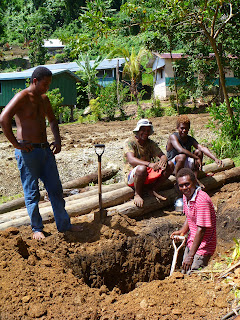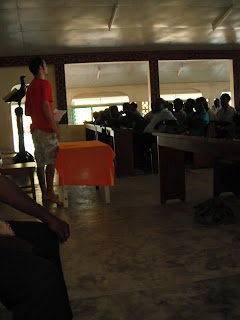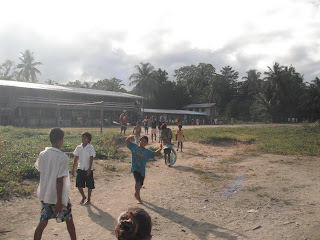It was just after dark in Honiara and some of the men loitering about the road-side were getting their drunken stagger on. A few of them yelled my way and then smiled when I waved and said hello. “It’s dangerous in Honiara after dark,” so I had been told by an ex-pat friend when I arrived, “take a taxi”.
I said hi to some young, dangerous looking guys at the bus stop who smiled shyly and gave me the only seat on the next bus that turned up. I sat up front, next to the driver as he weaved in an out of cars, flooring it on the straights and often taking the centre lane on the two lane road.
“Hey man, iu savve wea nao Heritage?” I asked (do you know where the Heritage is?).
He laughed at this skinny white dude who spoke pijin, “Bae mi tellem iu taim iumi kasem” (I’ll tell you when we’re there). We spent the rest of the journey chatting about Honiara and when we got to the Heritage, the driver pulled up onto the foot path to let me out rather than making me walk back from the nearest bus stop.
For a multi-million dollar hotel resort, it was a rather uninviting spectacle – three guards patrolled the gate and the steel-beam perimeter fence was rimmed with razor wire – but once past the intimidating security and walking across the car-park I was welcomed by a grand marble entrance-way and big “traditional” carvings. It occurred to me, all of a sudden, that when they arrive here in their nice, new, NGO-stamped Land Rovers, the guests of this pretentious fort would find the security comforting, not confronting – a barrier to the common folk – and they wouldn’t enter on foot, certainly not at night.
I wandered inside and navigated my way to the poolside bar where I met my mate Peter, an AusAid worker and class-act. He introduced me to his friends, a collection of Save the Children and UNHCR workers wearing suspiciously expensive-looking clothing. They said hello and quickly got back to their banter.
“I think about two weeks is the maximum time I could spend in a village, out in the provinces.”
“I can do ten days but that’s about my limit”
Are they for real? I thought.
“Lets have a look at the barbeque menu!”
“Na, I don’t like eating meat that resembles any kind of animal.”
Oh, this is going to be a fun evening.
“I wanted to experience the middle-class culture in India because I wanted to see how normal Indians live.”
No, apparently she doesn’t realise that about half of India lives in dire poverty.
I’m no taxonomist, but I’m fairly certain that these wet fish were an entirely different species from the bus driver who I had chatted with on the way into town. There were no rips in there singlets they were carefully groomed and articulate but entirely self-absorbed; the complete antithesis of the man driving the bus.
“I didn’t enjoy that much,” Peter said to me on the way home, “they just take themselves a bit seriously.”
He was right, but it wasn’t simply that which bugged me. These people lived in a psychological apartheid where they considered themselves entirely distinct from the locals. To be among the local population – not simply to have to interact with them as house maids or subservient colleagues, but to actually live on their terms – was unfathomable unless escape was imminent; escape back to their nice gated houses with nice, white flat-mates and nice western things; escape to a place where they would not be challenged.
It wouldn’t be fair to summarise here, that ex-patriot aid workers are self-interested, patronising racists or even naive do-gooders. Certainly there are large proportions of each of the above among the ex-pat community here in Honiara. But my point is simply this: the aid fraternity spend too much of their time teaching and writing reports to their bosses in western capital cities. If this aid is to be at all worth-while, they might first take a little more time to learn from the people they purport to serve. That the people of the Solomon Islands are among the happiest in the world and that the major aid donor countries – Australia, New Zealand and Japan – have frighteningly high suicide rates, speaks volumes about the importance of this mutual exchange. And just maybe, if we understood them a little better, we would stop wasting so much money.



































